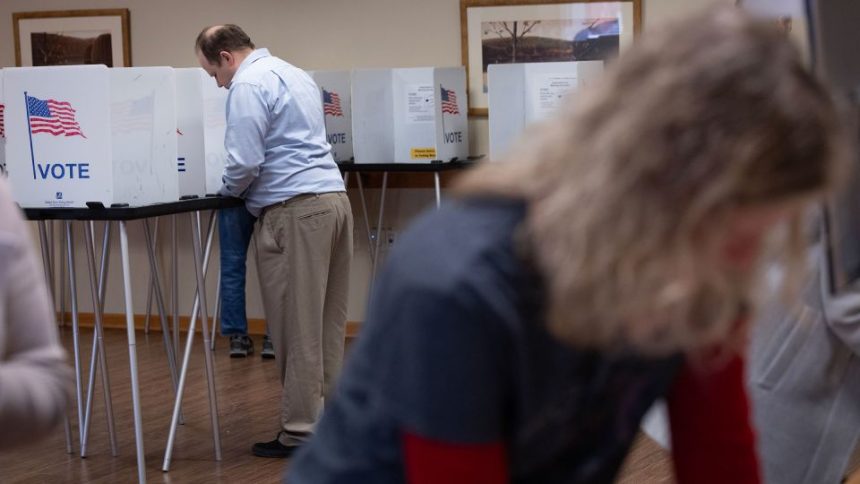President Donald Trump last year turned heads by telling his Christian supporters that, if they voted for him in 2024, “you won’t have to vote anymore.”
Some Trump supporters might be taking him a bit too literally.
Democrats’ win in a special election Tuesday in Northern Virginia was expected, given this was a deep-blue congressional district. But it was also a major Democratic over-performance. While Kamala Harris carried Virginia’s 11th District last year by 34 points, Rep.-elect James Walkinshaw won Tuesday by 50 points, 75%-25%.
And it was the merely the latest Democratic over-performance in an election this year.
In fact, Democrats are over-performing in special elections more than they ever have in the Trump era — dating back to his first term.
Special elections aren’t a totally reliable indicator of what’s likely to happen in future, regularly scheduled elections. They generally feature much lower turnout, which can lead to bigger swings that are hard to replicate when more people vote. Democrats also did pretty well in them in 2024, before losing the presidential race. And we’ve seen shifting political coalitions that could be giving Democrats a natural leg up in special elections.
Still, these elections can send signals about the state of the political environment and voter motivation. And those signals are pretty encouraging for Democrats right now, despite widespread disillusionment with the party’s brand.
Besides their 16-point over-performance in Virginia on Tuesday, they also over-performed by 16 and 23 points in a pair of Florida special congressional elections in April.
There have now been more than three dozen special congressional elections since Trump was elected president the first time in 2016. This year now features three of Democrats’ eight biggest over-performances.
The most analogous period was the first two years of Trump’s first term, in 2017 and 2018, when Democrats over-performed by between 10 and 21 points in six special elections for the House, as the University of Virginia’s Center for Politics recapped earlier this year.
Democrats went on to flip more than 40 House seats in the 2018 general election, their biggest gains in a single election since Watergate.
But those years were also more off a mixed bag, with Democrats occasionally under-performing in other races.
Democrats wound up over-performing by an average of eight points in 2017 and 16 points in 2018, per the University of Virginia analysis. They’re over-performing by an average of more than 18 points so far in 2025.
That’s including only three special elections for Congress this year, which is not exactly a huge data set. (We’ll get more data later this month, when Arizona holds a special election in its 7th Congressional District.)
But other indicators have also been strong for Democrats:
-
The Democratic-backed candidate over-performed the party’s 2024 margins by 11 points in perhaps the most high-profile race of 2025 so far, an April Wisconsin Supreme Court election in which Elon Musk figured prominently.
-
They’ve also notched often-large over-performances in state legislative special elections — including competitive races. Back in March, they flipped a Pennsylvania state Senate district that Trump had won by 15 points. Another win last month in Iowa meant they’ve now flipped two Iowa state Senate districts that favored Trump by double-digits. (The latter win was particularly significant, because it broke the Iowa GOP’s supermajority.)
-
If you include state legislative races, Democrats have over-performed in all types of special elections this year by an average of nearly 16 points, according to data crunched by left-leaning website The Downballot. That’s more than any single year in the Trump era. (Their previous best was 11 points in 2017.)
-
The special election signs were troubling enough for Republicans that the Trump administration in March scrapped its nomination of New York Rep. Elise Stefanik for United Nations ambassador. Trump acknowledged part of the reason was that the GOP worried about losing her district, despite it having favored him by 21 points in 2024.
All of this comes with the major caveats alluded to above.
The big one is that we’re confronting shifting political coalitions in which Trump’s and the GOP’s base seems to be increasingly comprised of irregular and less-engaged voters. That could still be a problem for them come the 2026 election, given Trump won’t be on the ballot to drive GOP turnout and midterm electorates are generally smaller and dependent on more-motivated voters. But these changing coalitions add uncertainty when it comes to how indicative special election results are of future elections.
Special and off-year elections also don’t directly predict what’s going to happen in the next regularly scheduled, even-year election. While the special elections of 2017-18 were good indicators of what lay ahead in the 2018 midterms, that wasn’t so much the case last year.
Democrats were enthused about their over-performances in these kinds of races after the US Supreme Court overturned Roe v. Wade in 2022, but that didn’t translate to a victorious year in 2024. (Though it’s worth noting that they didn’t over-perform from 2022-24 like they are now, and the Supreme Court decision was more than two years in the rearview by November 2024.)
But these elections aren’t the only signs of a potentially disillusioned GOP base. On issue after issue, polls have shown that a significant chunk of Republicans aren’t exactly enamored with how Trump’s second term is going — from tariffs to foreign policy to the Epstein files. The vast majority of Trump voters say they don’t regret their vote, but as many as 3 in 10 expressed some measure of concern in a poll conducted in late July.
And at least some Trump allies seem to be reaching for the panic button. Witness the reaction of Scott Presler, who has emerged as a prominent MAGA voice on data and voter turnout issues, to the Virginia special election Tuesday night.
“Y’all are going to lose 2026,” Presler posted on X, “& it’s going to be bad.”
For more CNN news and newsletters create an account at CNN.com









